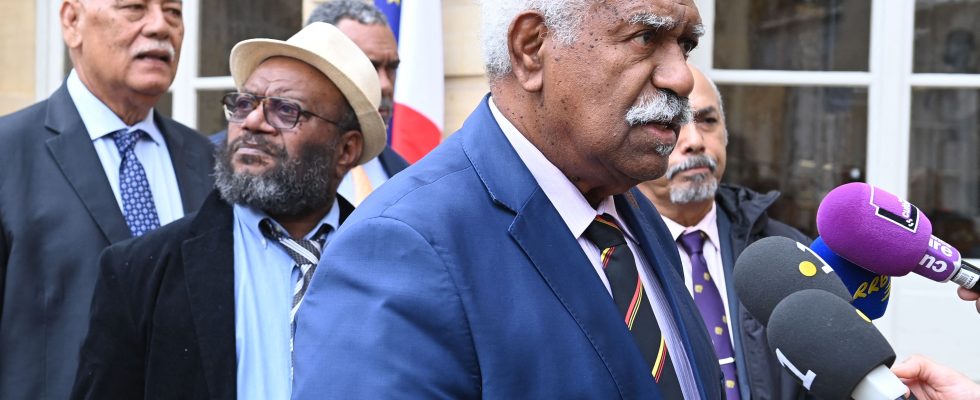Nearly a year and a half after the last referendum on the independence of New Caledonia, the future of the archipelago may be decided in Paris. Two delegations, one for independence and the other for remaining within the Republic, met Prime Minister Elisabeth Borne separately this Tuesday morning, April 11. A format “requested by the FLNKS” (National Kanak and Socialist Liberation Front).
The government was keen to bring the two camps together to discuss the future status of the territory. At the end of October, his desire to organize discussions had ended in failure. This time, the movement of the FLNKS delegation to France marks “a new important step”, insisted Matignon in a press release.
However, immediately after the first meeting, the FLNKS explained that the issues on the agenda were not its priority and that it had reminded the head of government of “the chaotic history of relations between France and the Kanak people”, since the taking possession of New Caledonia by France on September 24, 1853.
No agreement without tripartite meetings
The last referendum of December 12, 2021 had been boycotted by the FLNKS and the independence forces, who wanted a postponement due to the Covid-19 pandemic. The “no” to full sovereignty had finally obtained 96.5% of the votes, in a context of strong abstention. This last vote represented the third and last vote for the self-determination of the South Pacific archipelago, programmed by the Nouméa agreements of 1998. Before it, two other votes had taken place: in 2018, the “no” to the independence had won with 56.67% of the vote, and in 2020, with 53% of the vote.
The separatists want the electorate to be frozen, but want the right to self-determination to remain wide open in the new statute. Conversely, the loyalists demand that more inhabitants of New Caledonia be able to participate in the elections, and oppose any process of independence for the archipelago. The two positions seem difficult to remove. The president of the Caledonian Union, one of the main components of the FLNKS, Daniel Goa indeed recalled last week that “at this stage, (our representatives) will not negotiate anything and no decision can be taken”. For his part, Matignon assured that he was “convinced that an agreement is not possible without going through tripartite meetings and hoped that this format would be joined as soon as possible”. “If it’s this week, so much the better, but the FLNKS gave us to understand that it was unlikely,” added Matignon. The Ministry of the Interior does not “expect a joint statement at the end of this session.”
The members of the non-independence delegation, for their part, expressed their desire to see these negotiations become trilateral, bringing together the State, the independentists and the non-independentists.
“We can discuss it as soon as (the government) tells us […] what is the exit”, however posed at the end of the first interview the pro-independence president of the Congress, Roch Wamytan, recalling that “the trajectory must lead us to full sovereignty, within a deadline to be fixed”. In the meantime, the discussions must continue until the end of the week, in particular around Gérald Darmanin, Minister of the Interior and Overseas.
